BREAKING NEWS
Trump’s court fights scale new heights with mass rehirings ordered and a plea to the Supreme Court

The scale of the Trump administration’s legal battles expanded this week, with a federal judge ordering the government to rehire potentially thousands of probationary workers and the administration turning to the Supreme Court to combat the large number of nationwide injunctions slowing its agenda.
The orders by U.S. District Judges William Alsup and James Bredar on Thursday were among the largest-scale rulings against the administration to date out of the more than 100 lawsuits it’s facing as a result of its efforts to reshape the government. The orders give at least a temporary reprieve to tens of thousands of fired workers.
Follow live politics coverage here
The administration, meanwhile, has clearly grown frustrated with the repeated intervention from the courts. It went to the Supreme Court on Wednesday to challenge three nationwide orders barring President Donald Trump’s executive order on birthright citizenship from being implemented — and asking the court to “declare that enough is enough” when it comes to such orders.
Here’s a look at the biggest legal developments of the past week.
You’re rehired
In a pair of rulings Thursday, judges in California and Maryland found the administration acted unlawfully when it directed mass layoffs of an unspecified number of the federal government’s roughly 200,000 probationary workers — workers who were either recently hired or promoted to new positions. The government has not released the total number of employees who were laid off, but a coalition of states that sued over the firings in Maryland estimated it to be roughly 24,000 people.
In the more wide-ranging of the orders, the Maryland judge, James Bredar, said the government “must follow certain rules” when it conducts mass layoffs.
“In this case, the government conducted massive layoffs, but it gave no advanced notice. It claims it wasn’t required to because, it says, it dismissed each one of these thousands of probationary employees for ‘performance’ or other individualized reasons. On the record before the Court, this isn’t true,” Bredar wrote. “They were all just fired. Collectively.”
He ordered the actions removing them be stayed for at least 14 days while he weighs a longer-term preliminary injunction, and directed the employees be reinstated by Monday at 1 p.m. ET.
Bredar’s written order came hours after U.S. District Judge William Alsup issued a verbal order that probationary employees at six federal departments — Veterans Affairs, Defense, Energy, Interior, Agriculture and Treasury — should get their jobs back until the government follows proper procedures. He noted the February layoffs came immediately after directives from the Office of Personnel Management to fire probationary employees.
A template letter the Office of Personnel Management sent the agencies said the workers should be told, “The Agency finds, based on your performance, that you have not demonstrated that your further employment at the Agency would be in the public interest.” Despite that language, evidence in the case showed that many of the fired employees had received glowing work evaluations.
“It is sad, a sad day when our government would fire some good employee, and say it was based on performance, when they know good and well, that’s a lie,” Alsup said, calling the move a “gimmick” and “a sham in order to try to avoid statutory requirements.”
“It also happens to be that whenever you fire somebody based on performance, then they can’t get unemployment insurance. So that makes it even worse, doesn’t it? And then it makes it even worse because the next employer is going to say, ‘Well, have you ever been terminated based on performance?’ They’re going to have to say, ‘Yes,'” the judge added.
His ruling is likely only a temporary reprieve for at least some of the workers. He said at the hearing that there is nothing wrong with reductions in force “if it’s done correctly under the law.”
The Justice Department filed a notice of appeal on Alsup’s ruling on Thursday night and did the same on Bredar’s ruling Friday.
White House press secretary Karoline Leavitt blasted the judges as “judicial activists” on Friday, and said their actions were “unconstitutional.”
“You cannot have a low-level district court judge filing an injunction to usurp the executive authority of the president of the United States. That is completely absurd,” she said.
Seeking help from the Supreme Court
While the administration has had a number of wins in court, it has also been hit with a number of nationwide injunctions, including orders halting a federal funding freeze and another blocking it from cutting off grants to organizations with diversity, equity and inclusion programs.
The Justice Department went to the Supreme Court on Thursday in a case aimed at limiting “universal” injunctions in the future.
The petition cited three nationwide injunctions barring the administration from taking action on Trump’s executive order aimed at limiting birthright citizenship, and asked the high court to narrow the scope of the injunctions, potentially just to the people who live in the Democratic-led states that challenged it.
In her filing, acting Solicitor General Sarah Harris wrote that judges did not have the authority to order such broad relief, and that those types of injunctions “compromise the executive branch’s ability to carry out its functions.”
“This court should declare that enough is enough before district courts’ burgeoning reliance on universal injunctions becomes further entrenched,” she argued.
The judges in the birthright citizenship cases and the judge in the DEI case all found that it would likely be unconstitutional for the government to follow through on the Trump executive orders, so a nationwide ban was necessary.
The Supreme Court does not seem to be in a rush to hear the case — it asked the plaintiffs challenging the executive order to respond to the emergency filing by April 4.
BREAKING NEWS
How Trump united Canada against him and flipped its election upside down

The hostility extends to homegrown Trump supporters such as Canadian hockey legend Wayne Gretzky, who was at Trump’s Mar-a-Lago resort on election night and attended his inauguration. This week, viral photos from a Toronto liquor store showed labels under Gretzky’s wine range altered to include descriptions such as “weak & backstabbery.”
Former Prime Minister Jean Chrétien said Trump had “united us as never before.”
“I think I will propose him for the Order of Canada,” the country’s highest civilian honor, Chrétien joked as the governing Liberal Party met in Ottawa last weekend to elect a successor to Canada’s leader of almost a decade, the highly unpopular Justin Trudeau.
Experts say the man they overwhelmingly chose, Mark Carney, may be uniquely positioned to push back against Trump’s aggression, with a background in finance and crisis management that includes running the Bank of Canada after the 2008 global financial crisis and the Bank of England during the Brexit process.
Like Trump, Carney, who took office as prime minister on Friday, spent much of his life in the private sector and had never held elected office before becoming his country’s leader.
“He’s been sort of the global elite all his life,” Malloy said. “Normally, that’s not really the route for success for a rookie politician. But these are unusual times.”
‘Resurrected from the dead’
Only a few months ago, the Liberals under Trudeau were looking like “absolute toast” in the next Canadian election, which is required to take place by October of this year, Malloy said.
With his approval rating already at an all-time low, Trudeau’s problems were only compounded by Trump’s tariff threats, which began shortly after he was elected in November.
Internal disagreement over how to respond to those threats created turmoil among the Liberals, with Finance Minister Chrystia Freeland’s scathing resignation letter in December ultimately forcing Trudeau to announce he would step down.
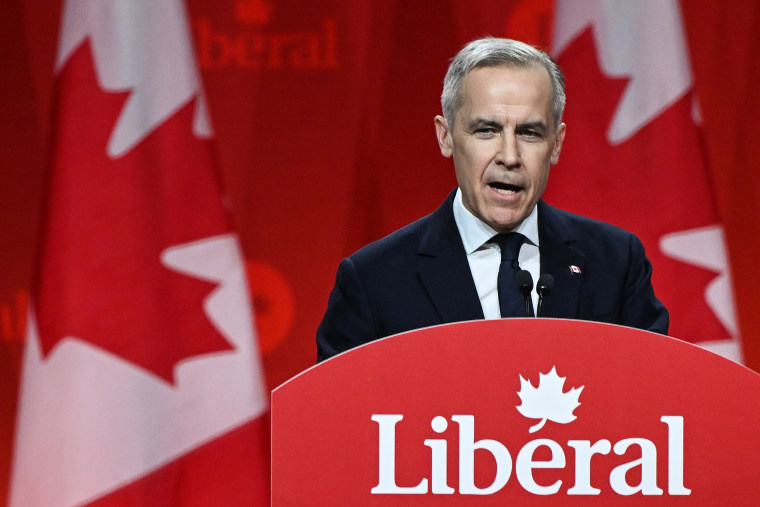
It seemed almost certain the Liberals would be thrashed in the next election by the Conservative Party, led by Pierre Poilievre.
Poilievre, whose style has been described as “Trump light,” had embraced the populist wing of his party, expressing support for truckers who paralyzed Ottawa with anti-vaccine protests in 2022. Among his supporters was Elon Musk.
Then Trump happened.
On his first day in office, Trump announced a 25% tariff on imports from Canada and Mexico, two of the biggest U.S. trading partners. Those tariffs were paused for a month before going into effect on March 4. Markets immediately began convulsing, and in the days that followed, Trump exempted more than a third of goods coming from Canada until April 2.
Trump said he was imposing the tariffs on Canada and Mexico because of their role in the U.S. fentanyl crisis and illegal immigration, mystifying Canadians who point to the U.S. government’s own data showing that Canada is responsible for less than 1% of the fentanyl and undocumented migrants coming across the northern and southern U.S. borders.
Canada is also subject to the 25% U.S. tariff on steel and aluminum imports that took effect globally on Wednesday.
Ottawa responded to those tariffs with its own levies on some $21 billion worth of U.S. goods, and it has also requested a dispute consultation at the World Trade Organization.
Alongside the tariffs, Trump has repeatedly referred to Trudeau as the “governor” of Canada, which with 40 million people has about the same population as California.
Trump’s derision continued on Thursday even as his secretary of state, Marco Rubio, made his first official trip to Canada for a meeting of top diplomats from the Group of Seven industrialized democracies.
“To be honest with you, Canada only works as a state,” Trump said from the Oval Office.
Asked about the issue on Friday, Rubio said it had not come up at the G7 meeting but that there was a “disagreement” between Trump’s position and the position of the Canadian government.
Canadian Foreign Minister Mélanie Joly said she told Rubio that “Canada’s sovereignty is not up to debate.”
“You’re in our country, you respect our people. Period,” she said at a news conference after the meeting in La Malbaie, Quebec.
Fueled by anger at Trump, Canadians have expressed growing support for the Liberals in the upcoming election, almost entirely closing the gap with the Conservatives in a matter of weeks. The Conservatives, who had a lead of almost 20 points a month ago, are now ahead by only 1 percentage point, the Canadian polling firm Nanos said this week.
“The Liberals have basically been resurrected from the dead” because of the crisis Trump created, Malloy said.
As Carney took office on Friday, he rejected Trump’s statehood proposal, saying “America is not Canada.”
“We will never, ever, in any way, shape or form, be part of the United States,” Carney, who turns 60 on Sunday, said after being sworn in.

Though Carney is a novice politician, that could work in his favor, said Maite Gonzalez Latorre, a program assistant at the Atlantic Council in Washington who is from Edmonton, Alberta.
“Mark Carney has experience in the U.K., he has experience in Canada, but he also has private sector experience,” Gonzalez Latorre said, “which I think will give him an advantage, especially when it comes to tariffs and and speaking with Trump directly.”
Carney’s top concerns for the moment, she said, are how to deal with Trump and how the U.S. tariffs are going to affect Canadians. His next moves and Trump’s response to them will influence when Carney calls the election, which could still end in victory for the Conservatives.
As with so many of Trump’s policies and actions, Malloy said, it remains unclear what exactly he is trying to achieve with his antagonism toward Canada.
His actions may have sidelined a potential ally in Poilievre, “who would have been a relatively supportive leader,” Malloy said. And though he took down Trudeau, Trump also revived the fortunes of Trudeau’s party, which is staunchly opposed to his policies.
“What is Mr. Trump’s endgame other than chaos? And what’s the point?” Malloy said. “Because so far, he’s only doing things that hurt his interests and the interests of the United States.”
BREAKING NEWS
Vance discusses Elon Musk and the economy in NBC News interview
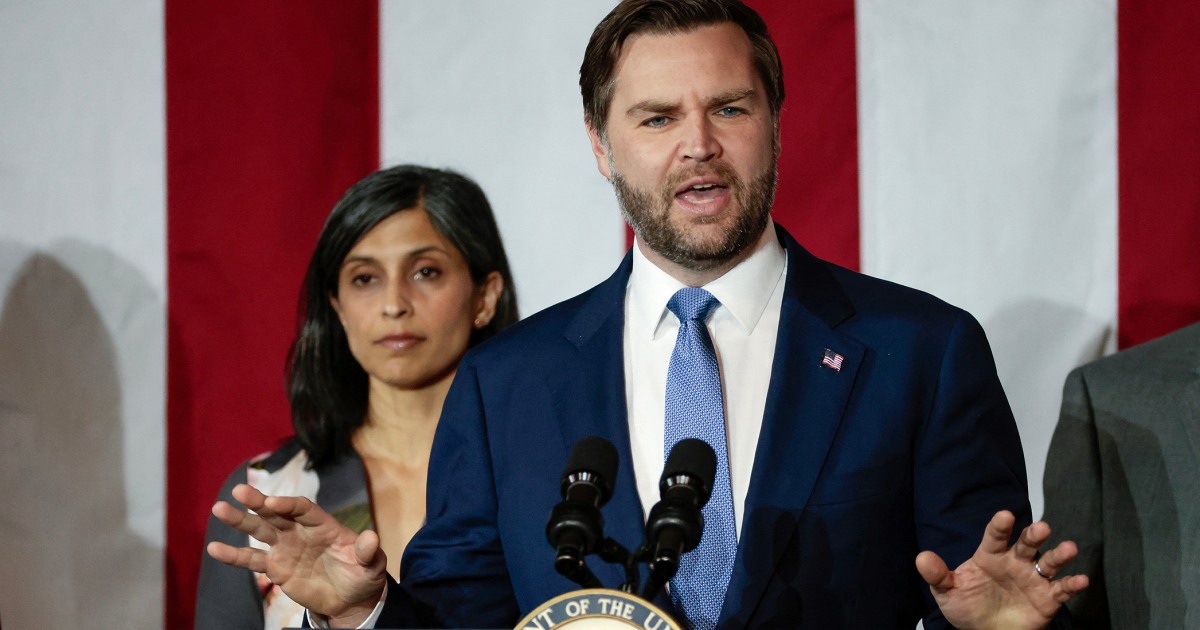
WASHINGTON — Vice President JD Vance acknowledged Friday that Elon Musk has made “mistakes” while executing mass firings of federal employees and emphasized that he believes there are “a lot of good people who work in the government.”
“Elon himself has said that sometimes you do something, you make a mistake, and then you undo the mistake. I’m accepting of mistakes,” Vance said in an interview with NBC News.
“I also think you have to quickly correct those mistakes. But I’m also very aware of the fact that there are a lot of good people who work in the government — a lot of people who are doing a very good job. And we want to try to preserve as much of what works in government as possible, while eliminating what doesn’t work.”
Vance’s gentler tone represented a contrast from the chainsaw approach that Musk, the world’s wealthiest man, has taken as he leads President Donald Trump’s initiative to slash federal spending and reorient the federal bureaucracy. The firings of thousands of government employees has been the centerpiece of Musk’s work over the first seven weeks of Trump’s second White House administration, with the cuts yielding lawsuits and pushback from judges. Musk has broadly characterized federal workers as “fraudsters” who can’t be trusted to do their jobs.
“I think some people clearly are collecting a check and not doing a job,” Vance said when asked about such comments from Musk. “Now, how many people is that? I don’t know, in a 3 million-strong federal workforce, whether it’s a few thousand or much larger than that.”
“However big the problem is, it is a problem when people are living off the generosity of the American taxpayer in a civil service job and not doing the people’s business,” he added. “That doesn’t distract or detract from the fact that you do have a lot of great civil servants who are doing important work. But I think most of those great civil servants would say we want to be empowered to do our job. We don’t want the person who doesn’t show up five days a week to make it harder for us to do what we need to do.”
Vance’s comments came during an exclusive and wide-ranging interview aboard Air Force Two, as the vice president and second lady Usha Vance returned from a visit to a plastics factory in Bay City, Michigan. His motorcade’s ride into town illustrated how different life is now for him and his young family.
Dozens of protesters had lined the street leading to the factory, greeting Vance and his traveling party with middle fingers and vulgar signs, one of which featured a crossed-out swastika and read “Go home, scumbag.” The previous night, Vance was booed while arriving for a performance at the Kennedy Center in Washington. And while walking with his 3-year-old daughter near their home in Ohio last weekend, Vance found himself in a civil but, in his description, upsetting conversation with pro-Ukraine demonstrators.
“The thing at the Kennedy Center I thought was funny,” Vance said aboard his plane Friday afternoon. “The thing by my house I thought was kind of annoying. I think you just kind of take the good with the bad. … I kind of just see it as, depending on your perspective, a feature or a bug of this new life.”
In his remarks at the factory, where he was welcomed by a friendlier, pro-Trump audience filled with local Republicans, Vance touted the administration’s commitment to manufacturing and economic recovery while tempering expectations for the rapid turnaround that Trump promised on the campaign trail.
A majority of respondents in two polls released this week — 56% of adults surveyed by CNN, 54% of registered voters surveyed by Quinnipiac University — said they disapproved of how Trump is handling the economy. Meanwhile, Trump’s push for tariffs on foreign products has ignited fears of a trade war that could raise consumer prices.
“Now I have to be honest with you,” Vance said in Bay City. “The road ahead of us is long, but we are already, in just seven short weeks, starting to see early indications of the president’s vision becoming our shared American reality.”
During the campaign, Vance frequently spoke of a woman he had met who said that she and her husband could no longer afford their weekly tradition of grilling steaks on Friday nights. Reminded of that story aboard his plane Friday, Vance described recent lower gas prices as a positive sign.
Vance also acknowledged that “you already see things leveling off to, not an ideal situation, but a much better and more significant improvement” while casting blame on former President Joe Biden, whose policies he said had left Trump in a hole.
“My ambition is that we see some pretty quick results, that you start to see at least a pathway towards financial stability,” said Vance, specifically noting 10,000 manufacturing jobs added last month. “You’re going to see progress. I think it’s going to be incremental progress. But I also think it’s important to be honest with people that you don’t get to $2 trillion deficits overnight. You’re not going to get out of $2 trillion deficits overnight.”
Vance also discussed his early role in shaping and articulating Trump’s foreign policy agenda, from a provocative speech at last month’s Munich Security Conference to an extraordinary Oval Office clash two weeks ago with Ukrainian President Volodymyr Zelenskyy, whom Vance had accused of being insufficiently thankful for U.S. aid.
“I just try not to be overly scripted,” Vance said before recalling his speech in Munich, which upbraided European leaders over issues such as free speech and mass migration. “The classic thing to do in Munich would have been to show up and give a speech about NATO or give a speech about where the Ukraine-Russia thing was at that moment in time, and just sort of thought to myself, like, ‘What is it that I think is really important to say?’ And the president was OK with me saying it, so I said it.”
Vance added that he doesn’t “go into these things trying to be like a spokesman for the administration. Some of that happens naturally, but fundamentally, the president is the spokesman for the administration, and everything flows from there. I try to do a good job. I try to say things both that I think are true but also are in accordance with the president’s preferences. And let the chips fall where they may.”
Trump, who is constitutionally barred from serving another term, raised eyebrows in a Fox News interview last month by saying it was “too early” to anoint Vance as his successor in 2028. Vance and others close to Trump have since brushed off the question and Trump’s answer to it, agreeing that such talk was premature.
Asked a variation of the question Friday — does he view himself as Trump’s successor? — Vance replied that he’s not thinking about a presidential campaign at the moment. He related the story of how he felt on Election Night, when, surrounded by his closest friends and family, it became clear he had won the vice presidency.
“Wow, I’m the vice president-elect of the United States,” Vance recalled thinking. “And, you know, if I never go further in politics, I’m totally fine with that, but we get a really good opportunity to do a lot of really good s— the next four years.”
“If I do really well for the next four years, everything else will take care of itself. … Now, like, yeah, in two and a half years, will that become harder? Will people be more focused on politics than on what the White House is maybe doing that particular day? Maybe,” he added.
“I mean, man, if I was like a central figure to getting the Russia-Ukraine crisis solved, who gives a s— what I do after this?” Vance said. “That’s kind of the attitude I take. So I’m very focused on doing a good job.”
BREAKING NEWS
Senate votes on government funding bill today; Trump delivers remarks at DOJ
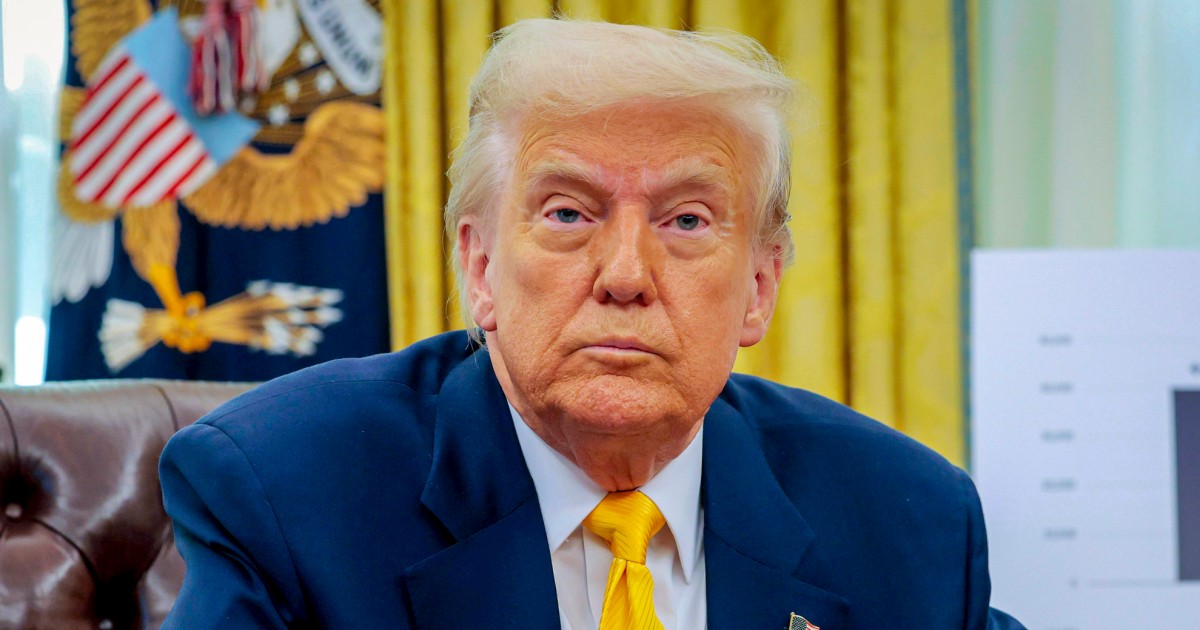
Democratic campaign committees and state parties are partnering to host a series of town halls in Republican-held districts after congressional Republicans were advised against holding more town hall-style events in person following tense interactions that went viral.
The list of districts where Democrats plan to hold events includes several that are held by GOP lawmakers who are expected to have close House races next year: Rep. Juan Ciscomani in Arizona’s 6th District, Rep. Gabe Evans in Colorado’s 8th District, Rep. Zach Nunn in Iowa’s 3rd District, Rep. John James in Michigan’s 10th District, Rep. Don Bacon in Nebraska’s 2nd District, and Reps. Ryan Mackenzie and Rob Bresnahan in Pennsylvania’s 7th and 8th districts, respectively.
Democratic National Committee Chair Ken Martin said in a statement that Republican lawmakers are “terrified to be in the same room as the people who sent them to Washington.”
“If they won’t talk to their own voters, then Democrats will. That’s why we’ll be hosting People’s Town Halls in all 50 states across the country, starting now with vulnerable GOP-held target districts. Working families deserve to have their voices heard, even if Republicans want to ignore them,” Martin added.
Democratic Congressional Campaign Committee Chair Susan DelBene, D-Wash., said in a statement that congressional Republicans “are failing to do the most basic aspect of their jobs: meeting with the people they represent.”
The move from Democrats, who have been on their heels since the start of the Trump administration, comes after several GOP lawmakers were confronted at town halls in their districts.
In one instance, videos showed attendees booing Sen. Roger Marshall, R-Kan., after he defended Elon Musk’s Department of Government Efficiency. In another instance, Rep. Keith Self, R-Texas, was confronted with chants of “Vote you out,” at one of his town halls.
Republicans have accused Democrats of organizing protesters to attend Republican-led town halls and disrupting them.
-
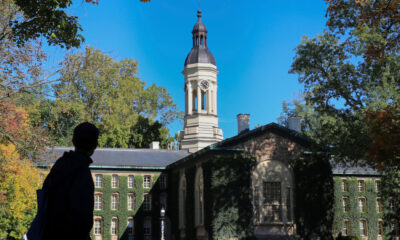
 Education1 day ago
Education1 day agoTrump administration suspends a host of federal grants to Princeton University
-

 Lifestyle2 days ago
Lifestyle2 days ago‘The Friend’: When the star of the movie is a very good boy
-

 Lifestyle2 days ago
Lifestyle2 days agoThere’s a new push to put whole milk back in school meals. Here’s what you should know
-
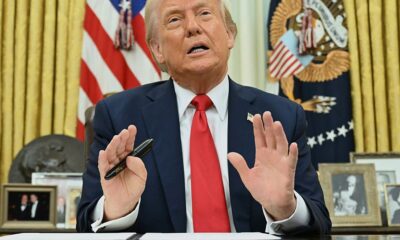
 Africa2 days ago
Africa2 days agoTrump hints at third term possibility, despite constitutional limits
-

 Sports2 days ago
Sports2 days agoDeshaun Watson: Cleveland Browns co-owner Jimmy Haslam calls controversial acquisition of QB a ‘big swing and miss’
-

 Sports2 days ago
Sports2 days agoNFL announces changes to kickoffs, overtime, how the ball is spotted and instant replay but owners table ‘tush push’ ban
-

 Europe2 days ago
Europe2 days agoUS citizen detained in Belarus accused of sneaking into country on cargo train
-

 Middle East2 days ago
Middle East2 days agoLibya: A Voice for Reconciliation | Documentary




